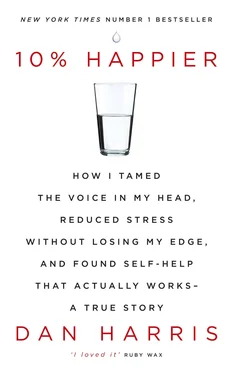I found a degree of comfort in the fact that my case was not an aberration. I learned of soldiers returning home and attempting to recreate the adrenaline rush of combat by driving at excessive speeds. And while the psychological impacts on veterans were well documented, an underreported study of war correspondents found high rates of post-traumatic stress disorder (PTSD), major depression, and alcohol abuse. The psychiatrist who conducted the research noted that, despite the risks, many journalists insisted on repeatedly returning to war zones. As one veteran reporter put it, “War is a drug.”
Despite having this larger context, I still could not get over that I had allowed this whole train wreck to happen, that I had risked everything I’d worked so hard to achieve. I felt disappointed—defective, even. I kept pushing Brotman to produce some sort of blockbuster psychological revelation. I hoped that I would be able to give him some magic set of data points from my past that would lead to an aha moment that would explain not just my mindless behavior, but also my penchant for worry, as well as the fact that I was a thirty-three-year-old with zero propensity for romantic commitment. Approximately a million times, Brotman—who had a pronounced allergy to the dramatic—tried to explain that he didn’t believe in such epiphanies and couldn’t suddenly conjure some “unifying theory.” I remained unconvinced.
Still, the mere fact of having someone smart to talk to—and to make sure I didn’t go back to doing coke in the bathrooms of Lower Manhattan bars—was enormously valuable. But there was something else afoot—another development that would also play a role in putting me on the weird and winding path toward finding the antidote to mindlessness. This new X factor was the emergence of an unsought and long-neglected assignment from Peter Jennings.
Seemingly unprovoked, the woman standing next to me erupted in a high-volume stream of feral gibberish.
“Mo-ta-rehsee-ko-ma-ma-ma-ha-see-ta!”
“Ko-sho-toh-toh-la-la-la-hee-toh-jee!”
She was scaring the crap out of me. I wheeled around to gape at her, but she didn’t notice because her eyes were closed, with her head and arms inclined skyward. It took me a few beats to put together that this person was speaking in tongues.
I looked around the packed 7,500-seat evangelical megachurch and realized that a whole bunch of these people were also doing it. Others were singing along with the surprisingly good band that was playing strummy, Christian rock up on the stage.
Coming through the crowd, glad-handing and backslapping as he went, was a sandy-haired guy in his forties. He caught a glimpse of me and started heading right in my direction. He thrust out his hand and said, “Hi, I’m Pastor Ted.” I took in his toothy grin, his boyish face, and his freshly pressed suit and immediately reached a whole set of conclusions about this man. All of which would eventually explode in spectacular, salacious fashion.
After the 2004 elections, the religion beat didn’t look like such a back-of-the-book dead end after all. Evangelicals had just mounted an impressive display of electoral muscle, helping George W. Bush remain in the White House. Questions of faith seemed to be at the core of everything, from the culture wars at home to the actual wars I’d covered overseas.
Even though I could now see the opportunity in the assignment Peter had given me some years before, it did not change my personal attitude about faith, which was one of disinterest bordering on disdain. Technically, I was not an atheist, as I’d told Peter when he’d first asked me to take over for Peggy Wehmeyer. Many years prior, I had decided—probably in some hackneyed dorm room debate—that agnosticism was the only reasonable position, and I hadn’t thought about it much since. My private view was quite harsh, and rooted in a blend of apathy and ignorance. I thought organized religion was bunk, and that all believers—whether jazzed on Jesus or jihad—must be, to some extent, cognitively impaired.
I had grown up in one of the most secular environments imaginable: the People’s Republic of Massachusetts. My parents met in medical school (where they shared a cadaver—true story). This was in the San Francisco area during the late 1960s, and they subsequently moved east and raised my brother and me with a mix of hippie warmth and left-of-Trotsky politics. Our childhood featured Beatles records, homemade tie-dyes, and touchy-feely discussions about our emotions—but zero faith. When I was maybe nine years old, my mother sat me down and matter-of-factly told me that not only was there no Santa Claus, there was also no God.
In seventh grade, I managed to convince my folks to let me go to Hebrew school and have a Bar Mitzvah, but that had nothing to do with religion; I was gunning for social acceptance in our heavily Jewish hometown. I also wanted the gifts and the party. My family being mixed, we found a reform temple that didn’t require that my mother convert. At Temple Shalom, I studied the basics of the Hebrew language, learned a bunch of Jewish folk songs, and flirted unskillfully with the girls at the annual Purim party. I don’t remember there being much God talk. No one I knew, other than maybe the rabbi, actually subscribed to the metaphysics, and since that time I hadn’t had a conversation of any significant length with a person of faith until Peter strong-armed me into this assignment.
After a three-year reprieve, during which time I covered the global, post-9/11 convulsions and then John Kerry’s failed presidential bid, I now decided the time was right to take a deep dive into religion. Weeks after Bush’s reelection, I traveled to a hard-right church in Florida, where I interviewed parishioners who were clearly feeling elated and empowered. One of them told me, “I believe our Lord elected our president.” Another said he wanted a Supreme Court that would enable him to take his kids to a baseball game and not have to see “homosexuals showing affection to one another.”
I interviewed the pastor, a televangelist by the name of D. James Kennedy, who was straight out of central casting: a tall, imposing man who dressed in robes and spoke with a booming voice. I asked, “What would you say to the people in those states who are really worried about the impact Christian conservatives can have on our government?” I expected him to offer an answer that was at least partially conciliatory. Instead, he issued a mirthless chortle and said, “Repent.”
In that moment, I converted happily from war reporter to culture war reporter. When the story aired, Peter and the rest of my bosses loved it, and I realized this beat that I very much hadn’t wanted was, in fact, tantamount to a full employment act for me—it got me on the air a lot, which was, of course, the coin of our particular realm.
For several years, I reported on every twitch, every spasm—or, as Jesus said in the Sermon on the Mount, every “jot or tittle”—of the national argument over abortion, gay marriage, and the role of faith in public life. There was a new tempest seemingly every day, from Christians boycotting Procter & Gamble for sponsoring Queer Eye for the Straight Guy , to the uproar over a two-hundred-pound, six-foot-tall, anatomically correct sculpture of Jesus made out of chocolate called “My Sweet Lord.”
When I wasn’t gorging on the culture wars, I was out producing lighter feature stories about evangelicals, feeling like a tourist in an open-air zoo. I filed reports on Christian reality TV shows, Christian rock festivals, Christian financial advisers, Christian plumbers, Christian cheerleaders, Christian health insurance—you name it. During a story about a Christian fitness club in California, I noted, “You can work your thighs while you proselytize.” Not my finest moment.
Читать дальше












